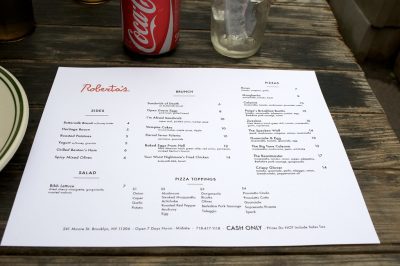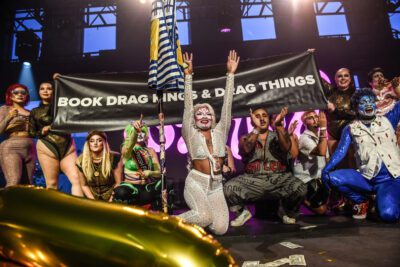In the Wake of Things to Come: A Conversation With Uniform
Ben Greenberg and Michael Berdan have slashed out a unique space in New York music. Their second full-length album, entitled Wake in Fright, is a pummeling collection of metal riffs, industrial textures, and brutal vocals. Greenberg says the album, “is our response to and our reflection of the overwhelming violence, chaos, hate, and destruction that confronts us.” The album was released January 20, 2017 on Sacred Bones, and feels all too appropriate right now. If you are in New York, their record release show is Feb 9th at Brooklyn Bazaar with Black Marble and You. Their live shows are an exercise in perfectly controlled chaos—towering speakers swallow the room while the duo thrash in a torrent of frantic energy. I quickly learned they never really stop moving, as I gave them a call Sunday morning at 10am. Why is it so often the nicest people make the most severe music?
What are you guys up to now (Sunday morning at 10am)?
Ben Greenberg: I’m heading to the studio.
Michael Berdan: I’m getting on a bus to go to Philly. Some friends of mine do screenings of old horror films from time to time. I usually work on the weekends but I managed to score today off. They are doing a screening of The Deadly Spawn and Killer Clowns from Outerspace. And I decided to treat myself.
My first question is, what’s it like to live with Anuj (a mutual friend)?
BG: …
MB: …
Just Kidding.
BG: [laughs]
MB: [laughs] That should be the whole interview. That could fill a good hour of conversation.
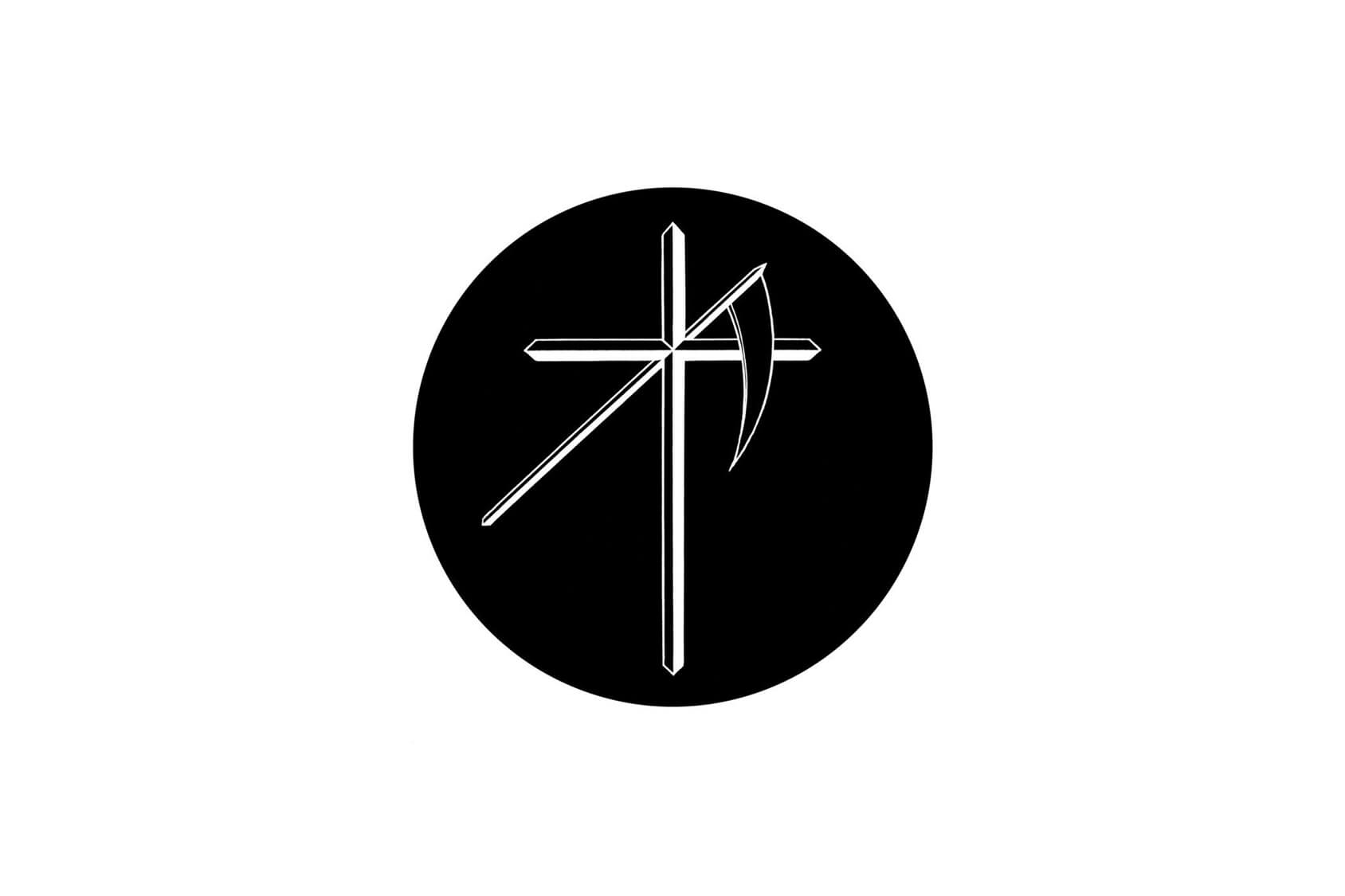
Your band has a very distinct and recognizable logo. Where did it come from?
MB: It’s funny, I had never been in a band that had any kind of imagery directly associated with it before, and I never really thought about it much. Ben suggested that we come up with a logo, and I pretty quickly put together this idea of a cross and a scythe. Cause crosses kinda look cool, and scythes kinda look cool. So I drew up this really shitty image of that. It was just scratchy garbage. Ben liked it well enough, so I sent it to Mark McCoy, who runs Youth Attack Records, and is a really accomplished fine artist, and a good friend. I asked if he would be down to make it not look awful, and he did. He did a great job, and we’ve been using it ever since.
So far your album covers have been stark, featuring the logo isolated and perfectly centered. The organic shape and different tones in this cover immediately stood out to me as a divergence. Who made it?
BG: The artist is Adam Helms, who is a friend of Berdan’s, and now a friend of mine [laughs]. This image is from a series called “Untitled (48 Portraits)” and it’s ink on mylar. He created the image on the cover, from something he saw on Frontline. They were interviewing an Al-Quaeda fighter, his head is covered in a shroud, he’s leaning forward, sitting cross legged on the ground. I think it was the first American TV interview post 9/11 with a member of Al-Quaeda. Adam turned it into this beautiful image. It’s really scary and hard to place, and you don’t know why it’s scary but it is. We looked through a ton of stuff and this one really jumped out. It just looks like the record feels.
MB: Yeah, he has this whole series of these disembodied hoods that fighters were wearing. So it’s these hoods minus these bodies that did hold these figures. It seemed to work.
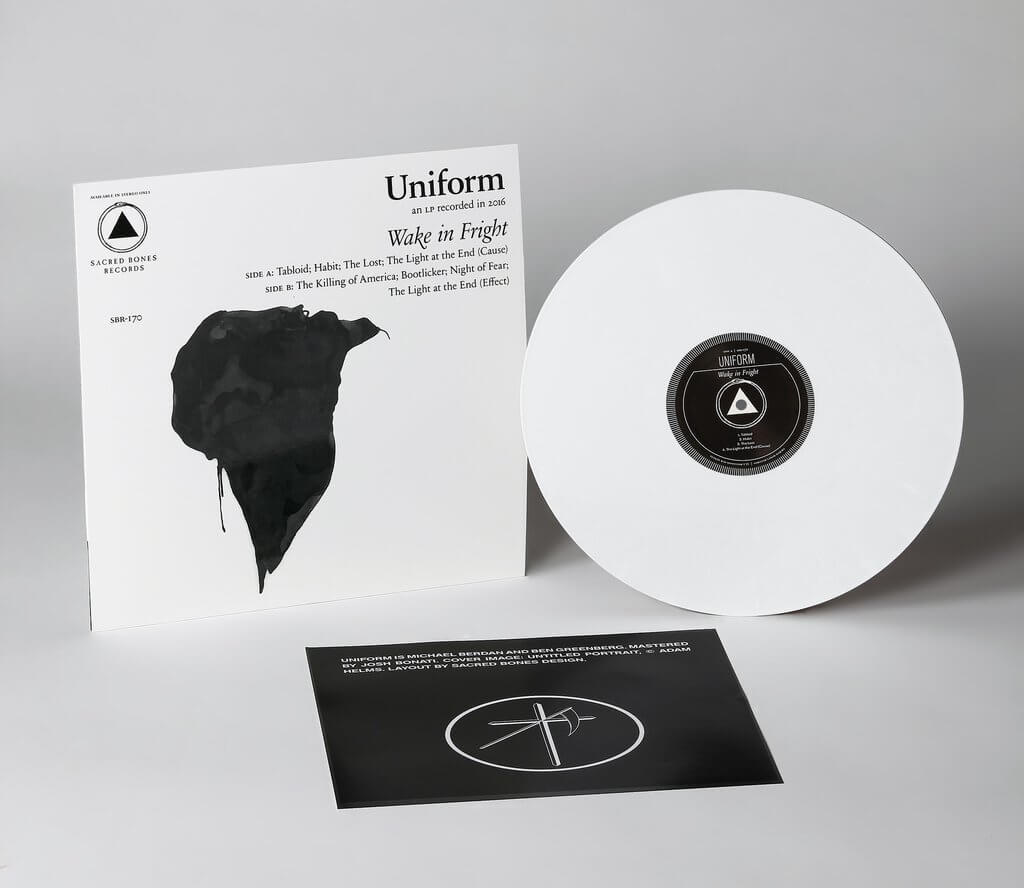
Did you find it was easier to record this time since you’ve done it before, or did you approach it differently?
BG: We did approach it differently, and we also gave ourselves a lot more time then we had in the past. That made a huge difference.
MB: I don’t know if it was easier. In the past we would have a couple of songs and we would map them out, and whatever came out first that would be that. With this we wanted to concentrate a lot more on having it be significantly more impactful and more dynamic than previous records, so it took a lot more time.
Your debut record was self-recorded, was this also? Where did you end up recording?
BG: We did it ourselves. Mostly my house. We did some preamping at some other spaces. We even tried doing vocals at a studio, but ultimately the best vocal takes we got were Berdan screaming at my cat in the living room.
MB: I love your cat, but I hate your cat. [laughs] A lot of the times I’ll go into a studio and I’ll freeze up because the pressure will be on, and it will take a lot of time and I’ll blow out my throat, and we won’t get anything. With this you have more room to breathe.
BG: Yeah literally. When you’re not trying to do an album’s worth of songs in a couple of days, and you can focus on one song it makes a huge difference, ya know? It helps you realize things about the song arrangements too. There were a number of them that we wound up editing the music after we did the vocals.
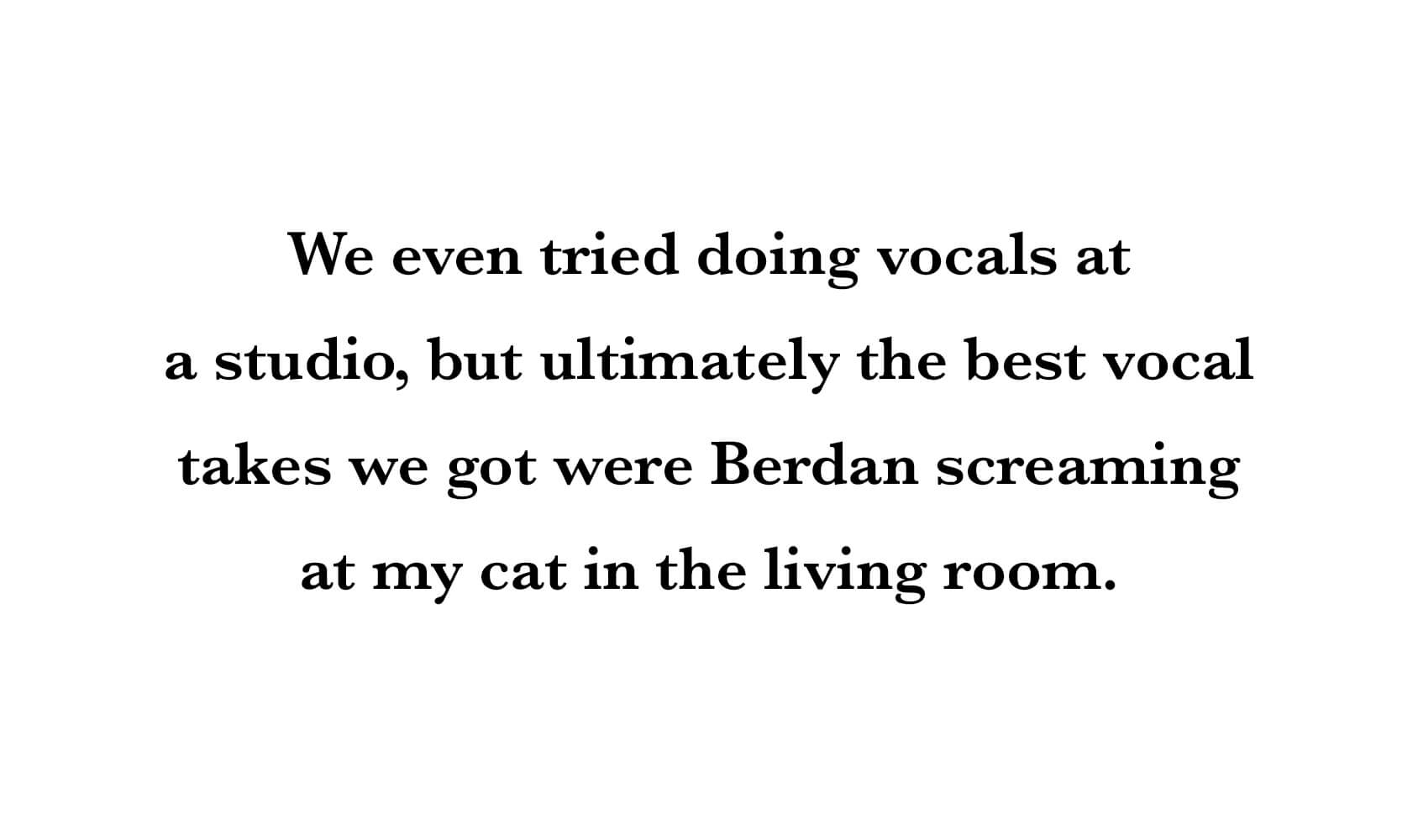
Did you record more songs then you ended up using?
MB: Yeah. A lot. It’s great. It’s like you don’t just use the first handful of things that come to your mind. We got to actually sit back and decide what worked versus what didn’t to make a linear, impactful album, as opposed to just taking what was there. We wrote a lot of shit, so that was really good. We think some of it was fucking garbage so hopefully that didn’t make it on.
BG: Yeah the garbage was deleted permanently in case anyone happened to hear it. We came up with enough songs to do this album and the Ghosthouse 10 inch record as well (released in December 2015).
I read in a previous interview that you sampled sounds from war. Where did you get those samples?
BG: A lot of it was movies and a lot of it was field recordings and stuff that I looked up. I did a lot of searching around for high quality field recordings. I spent a long time collecting sounds before I started putting songs together, and then continued collecting as we were putting songs together. I’d be watching movies at night, and I’d be like, “Oh, that was a really good explosion.” Pause it, rewind it, capture it, and it will change the whole feeling of the song.
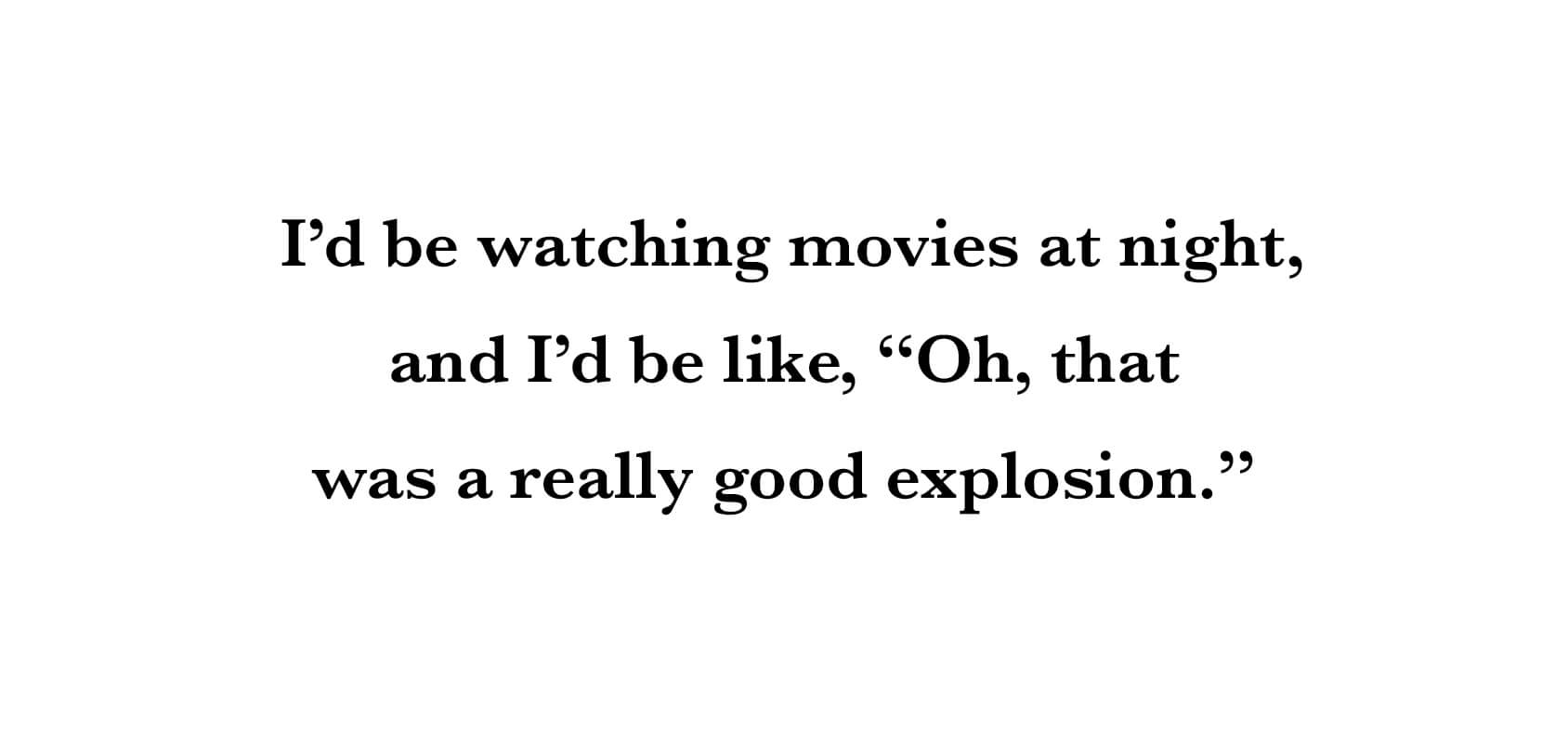
When you guys are writing a song do you both work on the structure of the songs?
MB: It depends on the song. A lot of times, Ben will come to me with an already finished product, or a near finished product, where drums, and synth are worked out already, and we’ll edit it from there. And i largely just have to concentrate on vocals. Other times I’ll come to Ben with a synth line or a riff and we’ll map it out from there. It’s really a song to song case. We both contribute heavily to structuring and song writing on a majority on songs.
Are you guys still writing stuff for your other projects, Hubble and York Factory Complaint or are those on hold?
BG: Nothing’s really on hold, but Uniform is quite a bit busier than either of those projects right now. Things tend to find their own natural scheduling.
Do you ever use any effects on your voice?
MB: On the record there is a decent amount of effects. Live, we use a Moogerfooger ring modulator dialed in pretty low. So there’s a little bit of vibrato and it’s a little crushed. It tends to blow out my channel in the mixer which also gives it a level of distortion. I don’t really like it dry. I like something to give it more depth.
BG: I don’t know if this is going to mean anything to anyone. We stumbled upon this motion shifting we could do. It makes his voice a really ominous quality. It makes a difference in how the voice sits in the music. Our material is so dense, every new element that you introduce, if it’s going to exist on an equal plane, has to be that dense as well. The a whole other thing I guess.
MB: It’s different for every song. Some songs will require a bit more physical vocal, like layering, or more echo, more reverb, more distortion, or pitch shifting. Other songs will require very little. It’s kinda whatever the music dictates.
Michael, did you start out as a vocalist?
MB: You know, I tried doing other things. I picked up a guitar at 12, and kind of learned my way around it a little bit. But at the end of the day I am hyper nervous and I can’t play very fast and I get self aware. So that didn’t work. I started singing in punk bands in my teens and that’s been my main thing.
BG: He’s not giving himself enough credit.
MB: Yeah, say what you will about Jello Biafra. He doesn’t play a fucking thing, but you’re never gonna say he’s not a musician or a songwriter. He is. If you take this seriously, your voice is an instrument, and a tool. It should be used as such. It’s as important as anything else. If you aren’t gonna step up then what the fuck are you doing? There’s no point.
Ben, was guitar your first instrument?
BG: I actually started as a drummer when I was 6. My parents say I asked them for a guitar when I was 4. I don’t really see how that’s possible, but that’s what they say.
You guys both have jobs that are flexible?
MB: Kind of.
MB: I’ve been at my job for a long time and I have a decent amount of vacation time and they are exceedingly kind to me. With work and with families, and mid 30’s responsibilities we make this work wherever we can. We’ve been lucky and fortunate to have our lives shaped the way that they are. I work 45 hours a week, full time.
BG: My schedule is kind of the opposite. I make my own hours in a sense. I make records for a living. So I kind of make my own schedule but I’m kind of at the mercy of whatever the particular sessions are for a given year. I try to schedule things as best as I can to make time for everything. That’s kind of how it has to be if you are doing music full time. Luckily there’s just two of us.
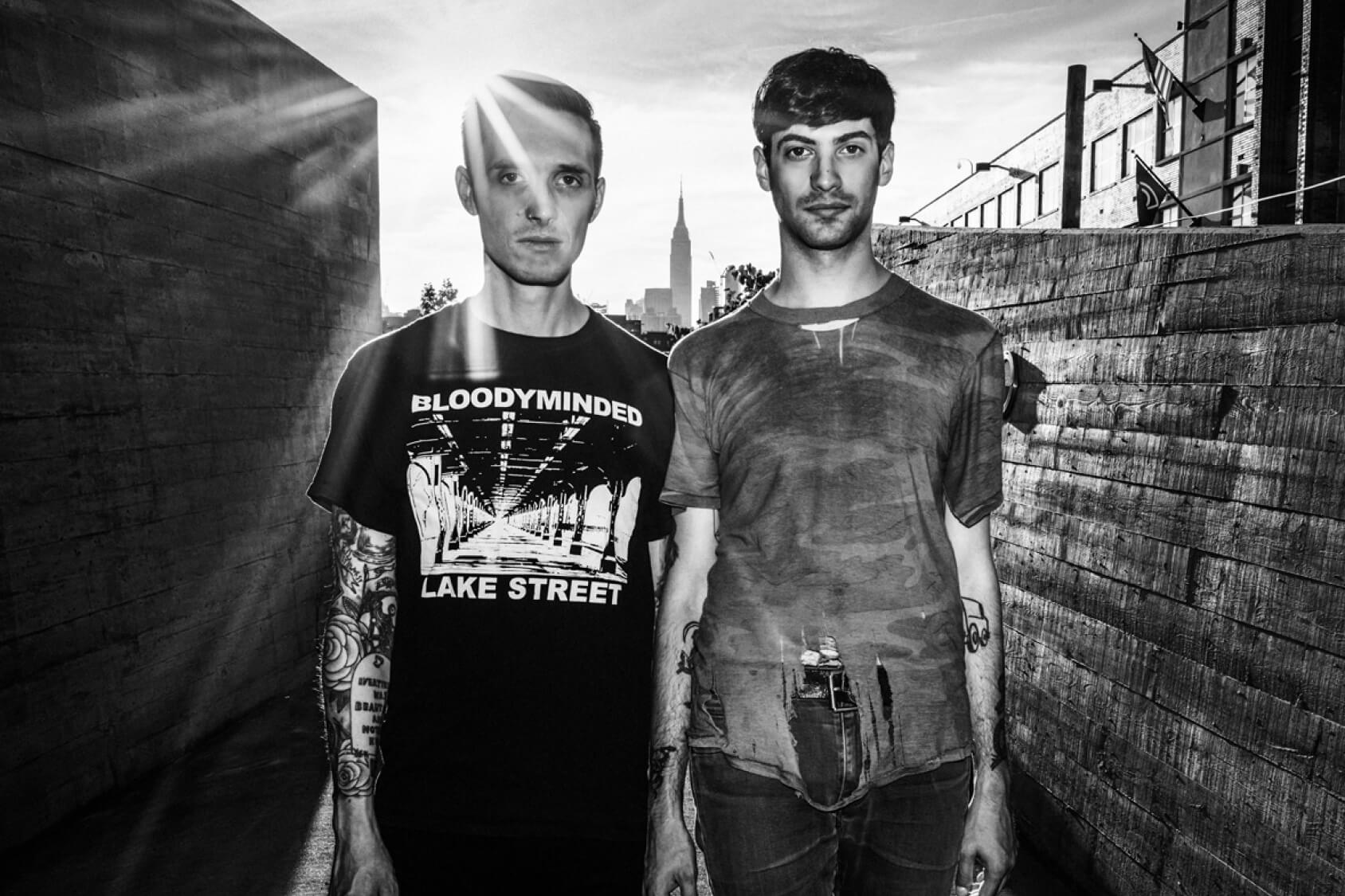

Michael Berdan and Ben Greenberg
What do you guys have coming up this year?
BG: We have a record release show Feb 9th at Brooklyn Bazaar with Black Marble and You. Then the week after that we are doing a West Coast tour. Which is the first time we are doing that in this band, so that’s exciting. We played Berserktown (in LA) a few years ago, but besides that we haven’t played any shows over there really. We are doing a few other shows with Black Marble, and a few with King Women.
I know genre is not the most fun thing to talk about, but I was looking through different interviews and write ups, and I found that people called you experimental, industrial noise punk, hardcore noise, and industrial punk. Do you have a way you describe yourselves?
BG: I usually tell people we are very, very, very loud.
MB: I think we both like to identify our band as a rock band one way or the other. You could break it down into 10,000 micro genres but none of that really matters. The more you try to adhere to a genre template, the more disappointed you’ll wind up being. We try to make what’s true to us in the moment. Whatever sound that might be. Genres are fickle, and trends are fickle. If you are making the music that’s true to who you are, that’s honest, and that’s not going anywhere. We’re a rock and roll band…I don’t know. [laughs]
BG: We’re an American band. ♦
Photos by Samantha Marble
You might also like 














